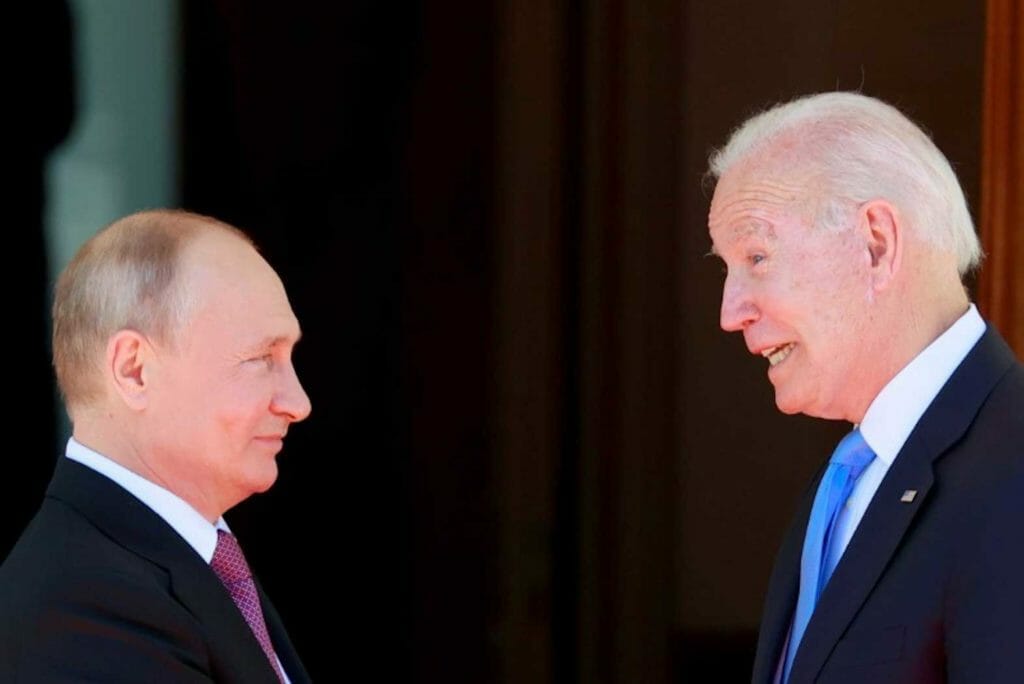Exclusive: How Biden could cut Russia off from world tech

U.S. President Joe Biden and Russia’s President Vladimir Putin meet for the U.S.-Russia summit at Villa La Grange in Geneva, Switzerland, June 16, 2021. REUTERS/Denis Balibouse/Poo/FILE
WASHINGTON – If Russia further invades Ukraine, the Biden administration could deprive it of a vast swath of low- and high-tech U.S. and foreign-made goods, from commercial electronics and computers to semiconductors and aircraft parts, people familiar with the matter told Reuters.
President Joe Biden would achieve that by expanding the list of goods that require U.S. licenses before suppliers can ship them to Russia, and his administration would then deny those licenses, the people said.
The measures, whose details have not previously been reported, are part of a suite of export control penalties that the United States has prepared to damage Russia’s economy, targeting everything from lasers to telecoms equipment and maritime items.
The White House, and the Commerce Department, which oversees U.S. export controls, did not immediately respond to requests for comment.
The package, which was still being fine-tuned over the weekend and could change, comes even as some White House officials have pledged to spare the Russian consumer from the brunt of the penalties.
The goal of the export control measures “is really to degrade Russia’s ability to have industrial production in a couple of key sectors,” Peter Harrell, who sits on the White House’s National Security Council, said in a speech last month. “We’re sort of thinking about how do we degrade Russia’s industrial production and sort of high-tech sectors rather than how do we sort of target the Russian people writ-large,” he added.
The administration has been vowing to hit Moscow with a potent cocktail of banking sanctions and export controls for weeks, in response to a massing of hundreds of thousands of Russian troops along Ukraine’s borders.
Reuters reported on Saturday that the Biden administration had prepared a package of sanctions against Russia that includes barring U.S. financial institutions from processing transactions for major Russian banks.
Their roll-out looks increasingly likely after Russian President Vladimir Putin on Monday recognized two breakaway regions of Ukraine as independent and told Russia’s defense ministry to deploy troops into the two regions to “keep the peace,” heightening tension with the West over Ukraine.
By far the most sweeping measure contained in the export controls package would take a page from restrictions placed on Chinese telecom giant Huawei Technologies Co Ltd by former President Donald Trump. It would dramatically expand the scope of the so-called Foreign Direct Product Rule (FDPR), requiring firms that use U.S. tools to make technology overseas to obtain a U.S. license before shipping them to Russia.
“It’s extraordinarily novel and has the potential for being far more significant than controls just on exports of these items from the United States,” said Washington lawyer Kevin Wolf, a former Commerce Department official.
Most chips are made with U.S. equipment, giving the United States leverage to control the flow of electronics to Russia.
U.S. suppliers would also have to obtain licenses for certain Russia-bound items that do not currently require them, such as civil aircraft parts. Whether Europe would follow suit with similar measures remains to be seen.
Japan said on Tuesday it stood ready to join the United States and other G7 industrialised nations in slapping sanctions on Russia, should Putin order an invasion of Ukraine.
In response to Moscow’s moves in eastern Ukraine, Biden vowed to end investment and trade with the regions while British Prime Minister Boris Johnson announced initial sanctions targeting Russian banks and billionaires.
Under changes proposed in the U.S. export control package, the license applications, in turn, would face a strict “policy of denial” standard of review, meaning only in rare cases would the administration approve them.
In addition, Russian companies listed as so-called military end users for their alleged ties to the Russian military, including a handful of aircraft producers, would be added to a trade blacklist known as the entity list. That would broaden the scope of items the companies would need licenses to obtain.
Finally, Washington would expand the scope of products that would need approval from the United States when sent to Russian military end users through an even broader application of the FDPR rule, subjecting to U.S. licenses requirements all items made abroad with U.S. tools and destined for companies that support the military.

